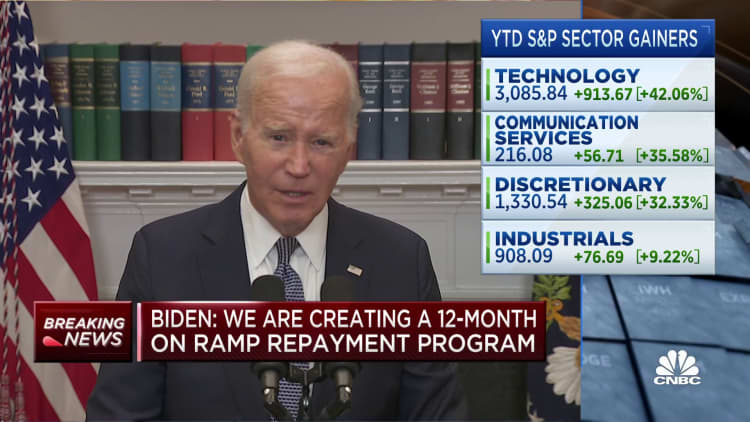U.S. President Joe Biden waves as he departs for Baltimore from the White House in Washington, U.S., April 5, 2024.
Kevin Lamarque | Reuters
President Joe Biden will unveil his new plan to forgive student debt on Monday, less than a year after the Supreme Court blocked his initial attempt.
Biden wants this aid package to survive any legal challenges. As a result, the president has made the program narrower by targeting specific groups of borrowers for debt forgiveness, including those facing financial hardship.
But one of the provisions under the new plan could still reach up to 25 million Americans. That’s Biden’s intent to “cancel runaway interest.”
More from Personal Finance:
Why gas is so expensive in California
Credit card users face ‘consequences’ from falling behind
After Biden praises progress on inflation, economists weigh in
“These historic steps reflect President Biden’s determination that we cannot allow student debt to leave students worse off than before they went to college,” U.S. Undersecretary of Education James Kvaal said in a statement.
Interest provision may erase up to $20,000 per borrower
Consumer advocates have long criticized the fact that interest rates on federal student loans may exceed 8%, which can make it tough for borrowers who fall behind or are on certain payment plans to reduce their balances.
More than 25 million federal student borrowers owe more than they originally borrowed, according to the Biden administration.
It estimates that, if its new plan is enacted as proposed, borrowers will get up to $20,000 of unpaid interest on their federal student debt forgiven, regardless of their income.
Certain low- and middle-income borrowers may benefit even more.
Single people who earn $120,000 or less, and married borrowers making $240,000 or under, could have the entire amount of interest that has accrued on their debt since they entered repayment canceled under Biden’s plan.
Borrowers would need to be enrolled in an income-driven repayment plan to qualify but shouldn’t have to apply for the relief.
“Student debt interest capitalization has been keeping families from accessing their version of the American Dream,” said Jaylon Herbin, director of federal campaigns at the Center for Responsible Lending. “Erasing that debt will lessen the burden of student loan debt on millions of borrowers and allow them to pay off their loans in a timely manner.”
Who may benefit from new forgiveness plan
In addition to the cancellation of interest, Biden’s new plan is also expected to forgive the debt of certain groups of borrowers, including those who:
- Are already eligible for debt cancellation under an existing government program but haven’t yet applied
- Have been in repayment for 20 years or longer on their undergraduate loans, or over 25 years on their graduate loans
- Attended schools of questionable value
- Are experiencing financial hardship
It’s not entirely clear yet how financial hardship will be defined, but it could include those burdened by medical debt or high child care expenses, the Biden administration said.
Biden originally attempted to cancel people’s student debt through executive action, but he’s now turned to the rulemaking process. The next step in that procedure is for the Biden administration to issue a proposed rule on its plan, which will be followed by a public comment period.
The president hopes to begin forgiving student debt before the November election.
Credit: Source link




